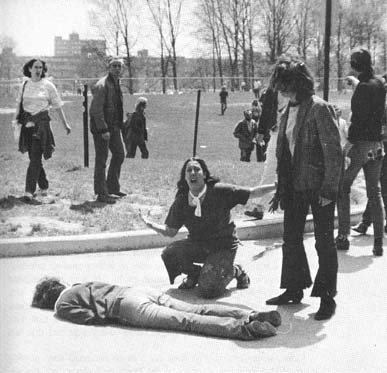May 4th

Why Kent State is important today.
THIRTY-SIX years ago today, Ohio National Guardsmen shot 13 college students at Kent State University who were protesting US incursions into Cambodia as part of the Vietnam War. Nine victims survived, including one who is confined to a wheelchair for the rest of his life. Four students -- Jeffrey Miller, Allison Krause, Bill Schroeder, and Sandy Scheuer -- were killed.
The students were unarmed, and the closest was more than 60 feet away from the Guard at the time of the shooting. There was no warning shot; the National Guard never issued an apology; and no one ever spent a day in jail for the killings despite the fact that the President's Commission on Campus Unrest, appointed by President Nixon in 1970, found the shootings to be ''unwarranted and inexcusable."
Yearly, since the tragedy, Kent State students, alumni, and others have met on the anniversary of the shooting to reflect and remember. Alan Canfora, who was shot by the Guard, says, ''The students today act as the conscience of the college, and the country . . . just like the students did in 1970."
This year's memorial will come, as the last three have, in the midst of a war that has become increasingly divisive. While the memory of Kent State and other violent clashes from that time between protesters and authorities did not deter the incumbent president from leading the country into another unpopular war, it is important to honor Kent State's spirit of dissent and what it taught about the bloody consequences of intense division.















<< Home